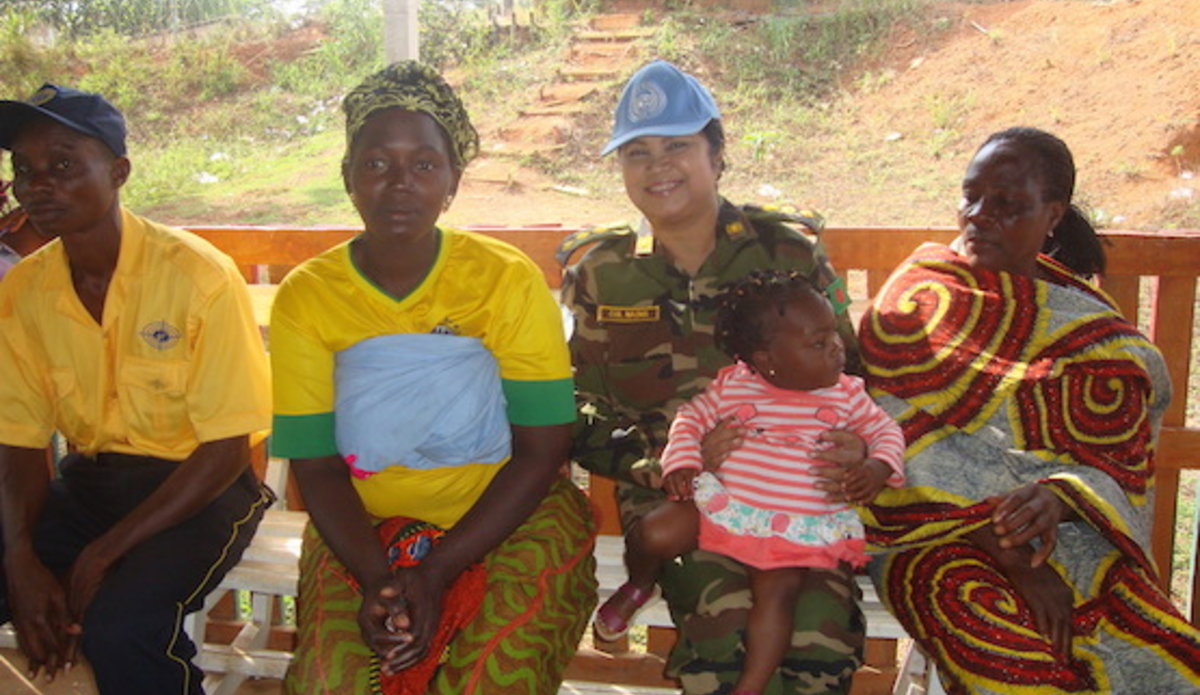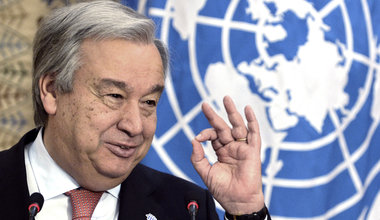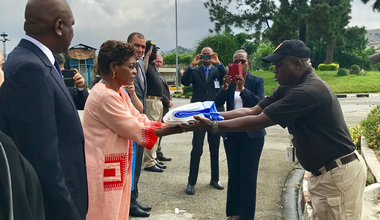Colonel Namza Begum, first female military contingent Commander in UN history: “UN female peacekeepers can also serve as role models”
The first female military Commander in the history of the United Nations is currently serving at the United Nations Operation in Côte d’Ivoire (ONUCI). Colonel Namza Begum, a national of Bangladesh is proud of her country, her work as a peacekeeper and her achievements…
Can you briefly tell us about yourself, your background, your past professional experience, prior to your arrival in the UN?
Colonel Nazma Begum: After having successfully completed my medical graduation, I joined the Bangladesh Army in 1993. I stood first in post-graduation (Master in Public Health) among all students. I also completed advance officers course from Bangladesh Army. I obtained the Diploma Course in medical sonography and advance Diploma in the same subject.
I completed my PhD in Maternal and Child Health. I treated thousands of patients during my military service.
I was the Commander of a field ambulance in Bangladesh Army which was the first time for a female officer. Also I was the Assistant Director Medical Services of Headquarters 11 Infantry Division, which was also the first time in the history of Bangladesh Army for a female officer.
As an author, I have written 52 books (Novels, Poetry, Medical Science, Travel, Children’s books).
How did you feel when you were told that you have been appointed to your current post (the first female military contingent commander in the history of UN)?
 Colonel Nazma Begum: I was highly honored and encouraged, as I could serve as a role model, for my appointment will empower women throughout the whole world. I am confident that women can control the whole world, as they can perfectly command and control troops. I express my appreciation for Bangladesh’s Army for its very challenging and courageous decision to select the first female military contingent commander in UN history. I am very proud because my Prime Minister, as well as the Speaker and Head of the Parliament are also women.
Colonel Nazma Begum: I was highly honored and encouraged, as I could serve as a role model, for my appointment will empower women throughout the whole world. I am confident that women can control the whole world, as they can perfectly command and control troops. I express my appreciation for Bangladesh’s Army for its very challenging and courageous decision to select the first female military contingent commander in UN history. I am very proud because my Prime Minister, as well as the Speaker and Head of the Parliament are also women.
I was confident that I can overcome any challenge and perform the same job in a same difficult situation, like a male counterpart; in time of peace as well as in time of war. Moreover, I believe female peacekeepers are not only able to perform in the same functions and capacities as their male counterparts, from command to frontline roles; they also bring an added value to military operations.
What are your exact duties at UNOCI and what difficulties have you experienced so far?
Colonel Nazma Begum : Let me tell you that this is not the first time I work for this Mission. I served in ONUCI from 2007 to 2008 as a Medical Evacuation (MEDEVAC) officer. I successfully evacuated about 50 critical patients by giving life support from level-II to level-III hospital.
This said, at ONUCI where I have been deployed for the second time since February 2016, I have a very efficient medical team with medical specialists: Anesthetist specialist, Surgeon, Orthopedic surgeon specialist, and Gynecologist. Every day, we treat between 5-15 UN staff, 30-70 local people (free treatment) and keep 5-20 inpatients. We also donate blood for the local hospital. Frequent free medical campaigns are also planned and performed by me. I have to command, control and administer all of my hospital staff. Always, I make my best effort to keep the moral high and spirit-de-corps of the unit.
I am also the country senior Military Officer of my country in ONUCI, which is also the first time for a female contingent commander in UN history. As country senior, a lot of responsible jobs, tasks and decisions are my routine daily duties. I have to look after the tasks and welfare of contingents from Bangladesh Army. Every time, I have to coordinate with the highest UNOCI authorities, from the Force headquarters to the Bangladesh Army. In any critical situation, I have to take the correct decision very promptly.
In ONUCI, I did not experience any difficulties at all, but I am convinced that the exact and accurate status of women is a yet to be achieved worldwide. Also in the UN, female peacekeepers accounts only for 5% in military and 10% in police. There are some communities in which women have no say or are not respected at all. Moreover, they face familial, cultural, social, religious barriers. In my heart, I pray that each and every woman could be honored and respected like their male counterparts in every community of the world. The UN’s female peacekeepers can also serve as a role model.
What do you have to tell other women willing to take-up a job similar to yours in the United Nations System? What would be your advice to them?
Colonel Nazma Begum : Women are the mothers of the world. They are the queens of every sweet home. They have the best human qualities. Women peacekeepers can bring an additional perspective in planning operations and in making key decisions, especially those affecting civilians, particularly women and girls. They have a better approach and access to UN’s women community. The local population, especially women and children are more comfortable with women peacekeepers.
Female peacekeepers also as role models in the local environment and can encourage women in host countries to consider security sector as a career option.
Increasing the deployment of female peacekeepers to peace operations significantly, contributes to achieving sustainable peace and the improved wellbeing of women and girls in conflict-affected regions.
My advice to women: all of you are capacitated, confident, qualified not only equal to your male counterparts, but in some aspects, you can perform better than them. You have some extra ordinary God-gifted qualities by which you can do some extraordinary jobs beyond men’s reach. To anyone willing to take-up a job of commander, like me, be confident, knowledgeable, brave, courageous, and generous, so that you can represent yourselves the best way that you can. Consider yourselves as a human being, as a leader, as a commander of peacekeepers rather than a woman. Consider yourselves as a front-runner in women empowerment. Go ahead. Hope for the best
 UN
UN United Nations Peacekeeping
United Nations Peacekeeping





